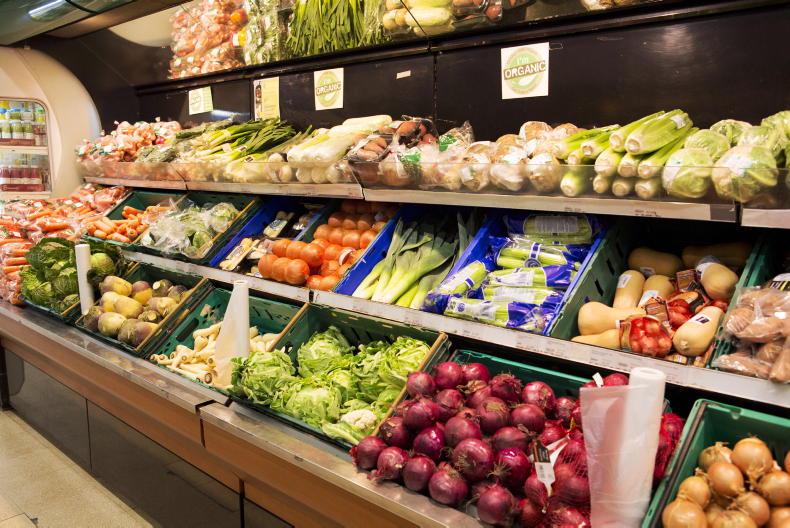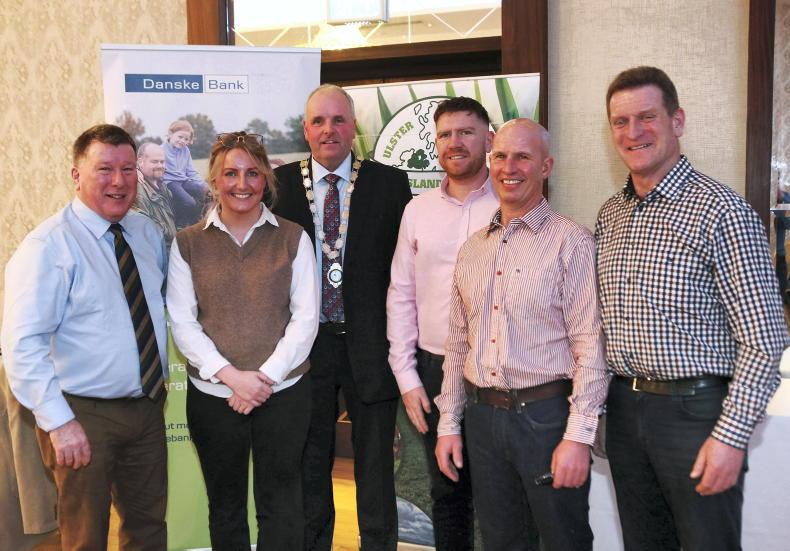Political leaders in NI have written to the vice president of the European Commission, Maroš Šefcovic, urging for an agreed approach to be found that will allow UK supermarkets to continue to operate as normal from 1 January 2021.
At issue is the potential raft of export health certificates and sanitary and phytosanitary (SPS) checks that will be required on containers bringing food from distribution centres in Britain to NI supermarket outlets once the Brexit transition period ends.
With estimates suggesting that one supermarket container could hold up to 400 products that would each require a certificate signed off by the likes of a vet, it is a major logistical challenge. Supermarkets warn that it could lead to less choice and higher prices for NI consumers.
In the letter signed by Arlene Foster and Michelle O’Neill, they describe that as an “unacceptable consequence” of the Brexit Withdrawal Agreement.
At last Thursday’s Stormont Agriculture committee meeting, DAERA’s top civil servants also highlighted the importance of the EU and UK finding a solution that would effectively allow supermarket lorries to be waived through at NI ports.
Despite the uncertainty, DAERA are working on the assumption that they will not have to do physical inspections of supermarket lorries, but for other traffic containing products of animal origin, they will have to check two to four containers per sailing.
“We can do that – that can be delivered,” DAERA chief vet Robert Huey told MLA’s.
But for DAERA controls to work at NI ports, they are also dependent on counterparts in Defra having businesses in Britain ready for the changes, and staff in place to issue export certificates and upload those certificates to an IT system.
“DAERA does not have visibility of the plans that Defra intends to put in place to deliver this essential element of the process,” acknowledged DAERA permanent secretary Denis McMahon.
As well as export certificates and physical checks, the third element of the control process is the sealing of containers before they leave a port in Britain. That is to be done under the supervision of a “DAERA authorised official” at Liverpool, Cairnryan and Heysham ports.
With Britain outside of the EU from 1 January 2021 and the Irish protocol within the Brexit Withdrawal Agreement meaning that NI must follow EU rules for goods, it means that seed and ware potatoes might not be able to move from Britain to NI.
At the Stormont Agriculture committee last week, DAERA officials explained that Britain must get listed as an approved third country by the EU for this trade to continue.
“We are working very closely with Defra to see what can be done about this, but there may be some gap after 1 January in getting that listing in place,” said DAERA permanent secretary Denis McMahon.
The movement of goods from NI to Britain after 1 January 2021 seems to be much less of a concern for DAERA officials than those moving in the opposite direction.
Draft UK legislation defining what qualifies for unfettered access to Britain states that a good should either be processed, or present in NI. That still leaves the possibility that EU produce could be moved via NI into Britain to avoid any potential checks or tariffs.
“Anti-avoidance measures will seek to address that. We don’t have sight yet of what they will look like. They are to be in place before the end of the year,” DAERA deputy secretary Norman Fulton told MLAs at Stormont last Thursday.
Dublin port
However, while NI produce is to have unfettered access to Britain when moved through the likes of Larne or Belfast ports, that might not be the case for around 25% of NI agri-food goods that go to Britain via Dublin port. Some of that might have to be re-routed back through NI ports, although that will depend on the nature of controls that apply through Dublin, and whether there is a free trade agreement between the EU and UK, said Fulton.
He was also asked for his view on the potential exclusion of NI produce from some EU trade agreements with third countries. That issue has arisen because even though NI will be following EU rules, it is still part of the UK customs area after Brexit.
While Irish Foreign Affairs Minister Simon Coveney has suggested that it might be necessary for the EU to approach each individual third country to ask for NI origin goods to be allowed to access each EU trade deal, Fulton believes there might be other solutions.
One possibility would be using the principle of “accounting segregation”. It is often written into trade deals, and gives an exporter some leeway when using raw materials sourced from different countries.
The other potential solution is that the UK rolls over these EU trade deals, and secures a route into those same markets for mixed origin (UK and Ireland) goods.
Read more
Coveney wants NI access to EU deals
Seed supply uncertainly for potato growers
Time running out for NI brexit checks
Political leaders in NI have written to the vice president of the European Commission, Maroš Šefcovic, urging for an agreed approach to be found that will allow UK supermarkets to continue to operate as normal from 1 January 2021.
At issue is the potential raft of export health certificates and sanitary and phytosanitary (SPS) checks that will be required on containers bringing food from distribution centres in Britain to NI supermarket outlets once the Brexit transition period ends.
With estimates suggesting that one supermarket container could hold up to 400 products that would each require a certificate signed off by the likes of a vet, it is a major logistical challenge. Supermarkets warn that it could lead to less choice and higher prices for NI consumers.
In the letter signed by Arlene Foster and Michelle O’Neill, they describe that as an “unacceptable consequence” of the Brexit Withdrawal Agreement.
At last Thursday’s Stormont Agriculture committee meeting, DAERA’s top civil servants also highlighted the importance of the EU and UK finding a solution that would effectively allow supermarket lorries to be waived through at NI ports.
Despite the uncertainty, DAERA are working on the assumption that they will not have to do physical inspections of supermarket lorries, but for other traffic containing products of animal origin, they will have to check two to four containers per sailing.
“We can do that – that can be delivered,” DAERA chief vet Robert Huey told MLA’s.
But for DAERA controls to work at NI ports, they are also dependent on counterparts in Defra having businesses in Britain ready for the changes, and staff in place to issue export certificates and upload those certificates to an IT system.
“DAERA does not have visibility of the plans that Defra intends to put in place to deliver this essential element of the process,” acknowledged DAERA permanent secretary Denis McMahon.
As well as export certificates and physical checks, the third element of the control process is the sealing of containers before they leave a port in Britain. That is to be done under the supervision of a “DAERA authorised official” at Liverpool, Cairnryan and Heysham ports.
With Britain outside of the EU from 1 January 2021 and the Irish protocol within the Brexit Withdrawal Agreement meaning that NI must follow EU rules for goods, it means that seed and ware potatoes might not be able to move from Britain to NI.
At the Stormont Agriculture committee last week, DAERA officials explained that Britain must get listed as an approved third country by the EU for this trade to continue.
“We are working very closely with Defra to see what can be done about this, but there may be some gap after 1 January in getting that listing in place,” said DAERA permanent secretary Denis McMahon.
The movement of goods from NI to Britain after 1 January 2021 seems to be much less of a concern for DAERA officials than those moving in the opposite direction.
Draft UK legislation defining what qualifies for unfettered access to Britain states that a good should either be processed, or present in NI. That still leaves the possibility that EU produce could be moved via NI into Britain to avoid any potential checks or tariffs.
“Anti-avoidance measures will seek to address that. We don’t have sight yet of what they will look like. They are to be in place before the end of the year,” DAERA deputy secretary Norman Fulton told MLAs at Stormont last Thursday.
Dublin port
However, while NI produce is to have unfettered access to Britain when moved through the likes of Larne or Belfast ports, that might not be the case for around 25% of NI agri-food goods that go to Britain via Dublin port. Some of that might have to be re-routed back through NI ports, although that will depend on the nature of controls that apply through Dublin, and whether there is a free trade agreement between the EU and UK, said Fulton.
He was also asked for his view on the potential exclusion of NI produce from some EU trade agreements with third countries. That issue has arisen because even though NI will be following EU rules, it is still part of the UK customs area after Brexit.
While Irish Foreign Affairs Minister Simon Coveney has suggested that it might be necessary for the EU to approach each individual third country to ask for NI origin goods to be allowed to access each EU trade deal, Fulton believes there might be other solutions.
One possibility would be using the principle of “accounting segregation”. It is often written into trade deals, and gives an exporter some leeway when using raw materials sourced from different countries.
The other potential solution is that the UK rolls over these EU trade deals, and secures a route into those same markets for mixed origin (UK and Ireland) goods.
Read more
Coveney wants NI access to EU deals
Seed supply uncertainly for potato growers
Time running out for NI brexit checks








SHARING OPTIONS